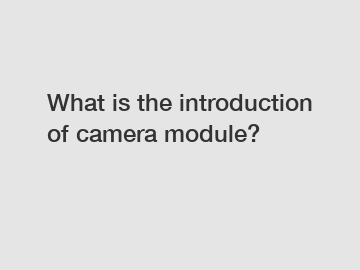What is the introduction of camera module?
Camera Module: A Brief Overview.
A camera module, also known as an image sensor module or an image sensor camera, is a device that integrates an image sensor, a lens, and other components into a compact package. This self-contained unit captures and processes images or videos when connected to an electronic device. The module's primary function is to convert optical information into electronic signals that can be further processed and displayed on a screen.
Understanding the Functionality.

The camera module consists of several key components that work together to capture and process images. Let's delve into the functionalities of each component:
1. Image Sensor: The image sensor is the heart of the camera module. It captures light and converts it into electrical signals. The most common types of image sensors used are complementary metal-oxide-semiconductor (CMOS) and charge-coupled device (CCD). CMOS sensors are more popular due to their lower power consumption, faster readout speeds, and better integration with integrated circuits.
2. Lens: The lens is responsible for focusing light onto the image sensor. It determines the field of view, depth of field, and overall image quality. Different lens configurations, such as fixed-focus or autofocus, cater to various camera module applications.
3. Signal Processor: Once the image sensor captures the light, the signal processor processes the electrical signals. It performs several tasks, including noise reduction, color correction, image enhancement, compression, and encoding.
4. Interface: The camera module is connected to the host electronic device through an interface like MIPI (Mobile Industry Processor Interface) or USB (Universal Serial Bus). This connection facilitates the transfer of image data and control signals.
Importance of Camera Modules.
1. Photography and Videography: Camera modules have made high-quality photography and videography accessible to the masses. They allow users to capture their memories and create content effortlessly, with features like autofocus, image stabilization, and high-resolution capabilities.
2. Video Conferencing and Communication: Camera modules enable seamless video conferencing and communication. From business meetings to virtual gatherings with loved ones, these modules facilitate real-time visual interaction regardless of geographical distances.
3. Augmented Reality (AR) and Virtual Reality (VR): Camera modules play a vital role in the AR and VR experiences. They capture the real world, providing input for visual overlays and immersive simulations. AR games, virtual tours, and interactive applications heavily rely on camera modules.
Closing Thoughts.
For any further information or queries, please do not hesitate to contact us.
If you want to learn more, please visit our website USB Camera Module with Auto Focus, 8mp USB Camera Module, Binocular USB Camera Module.

Comments
0